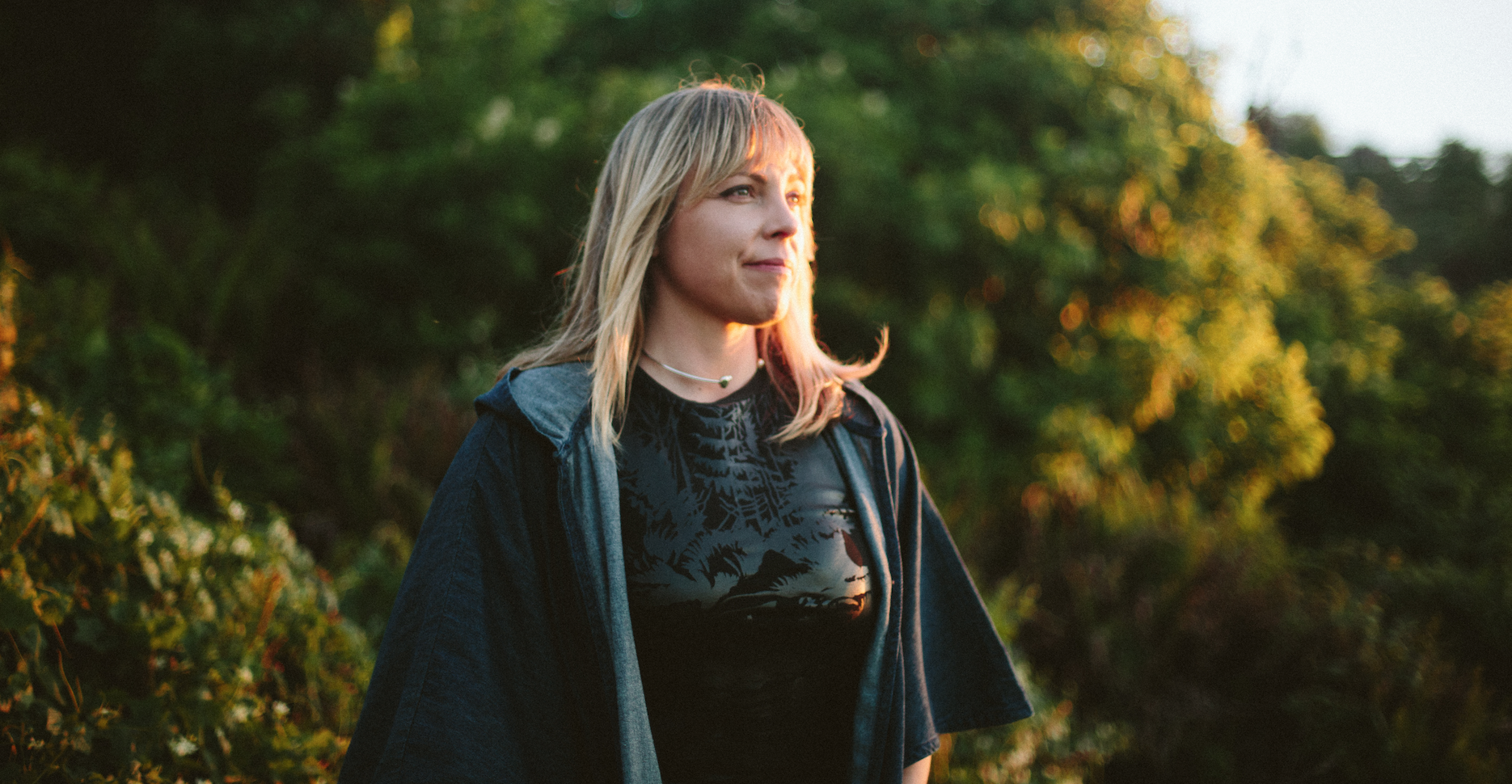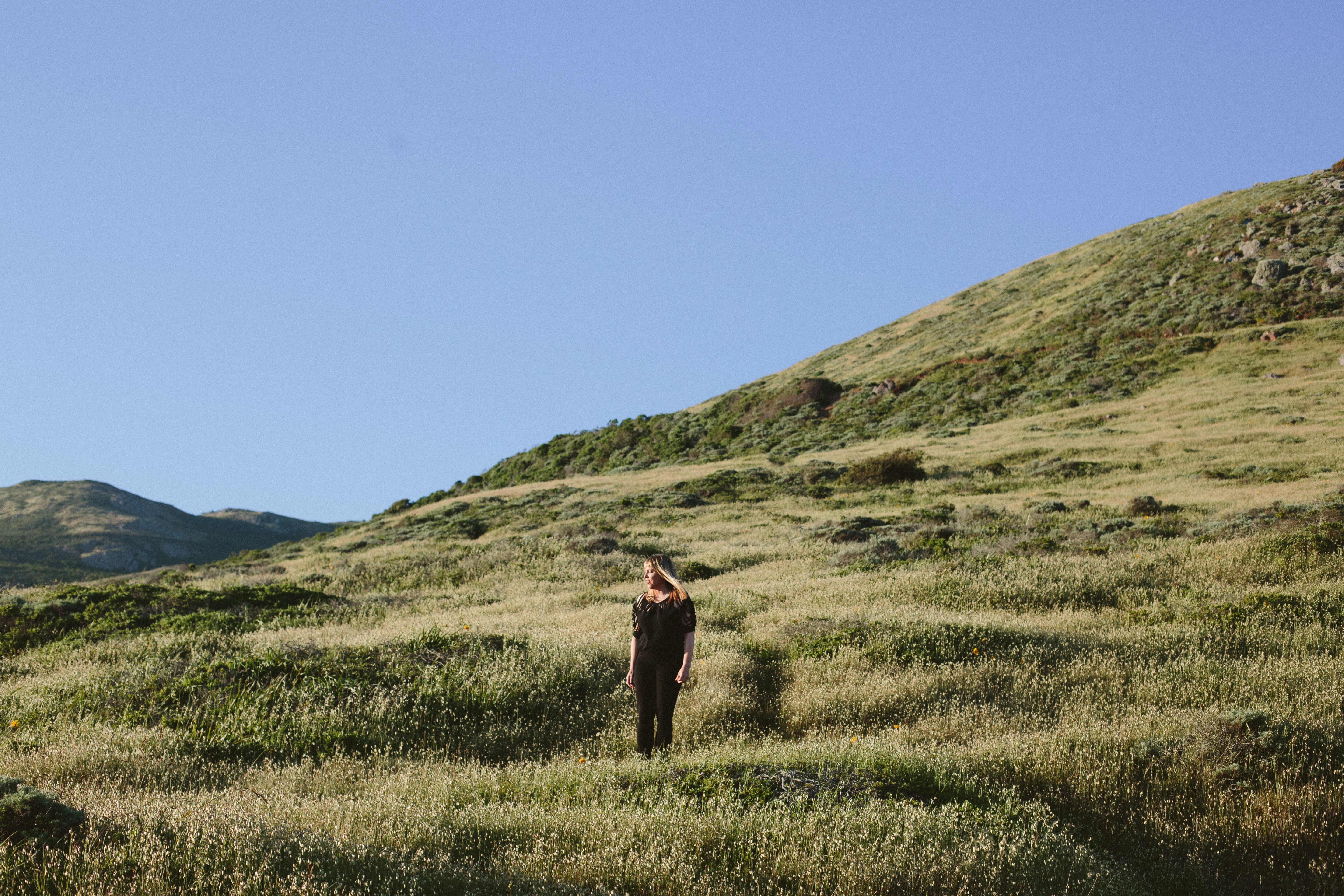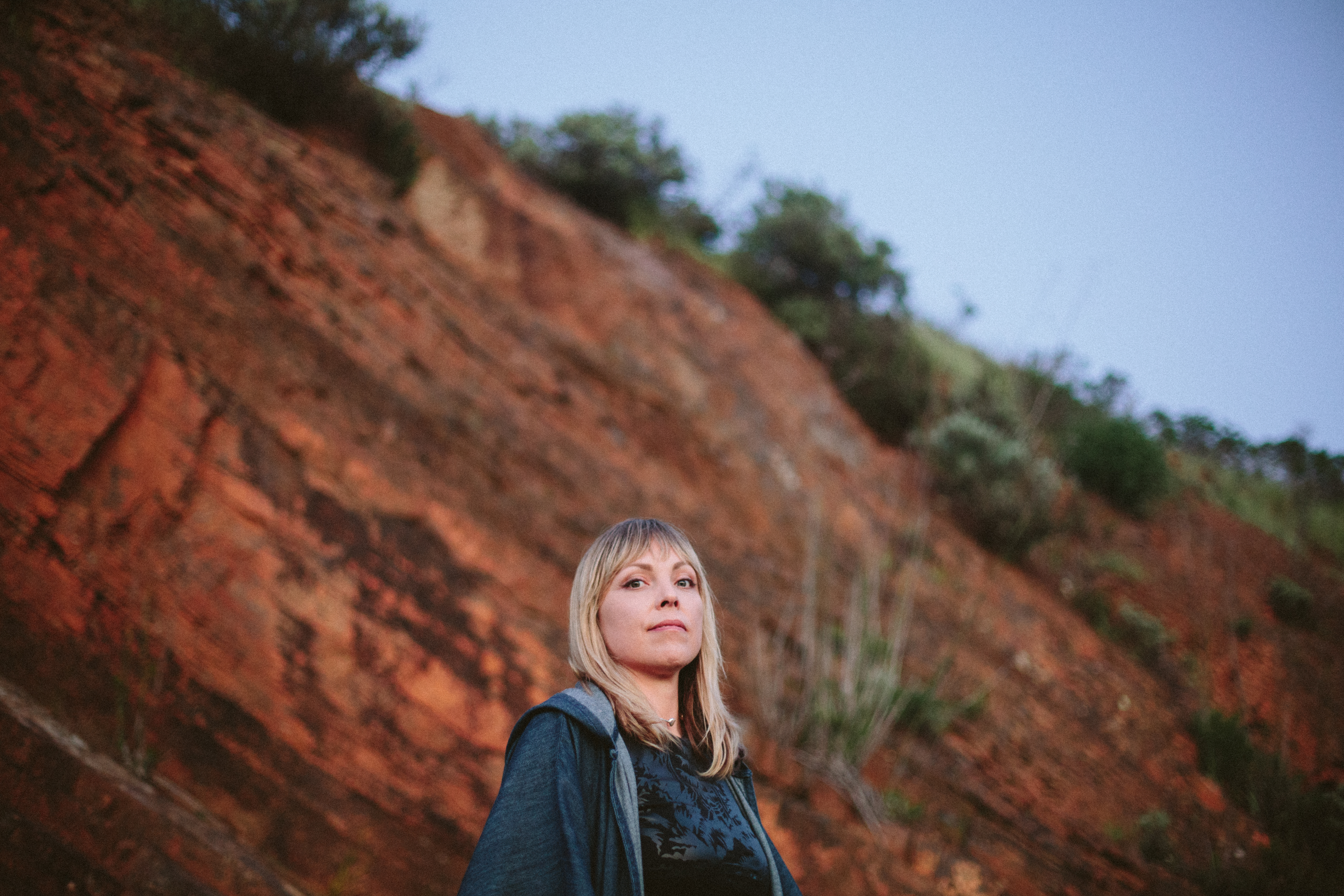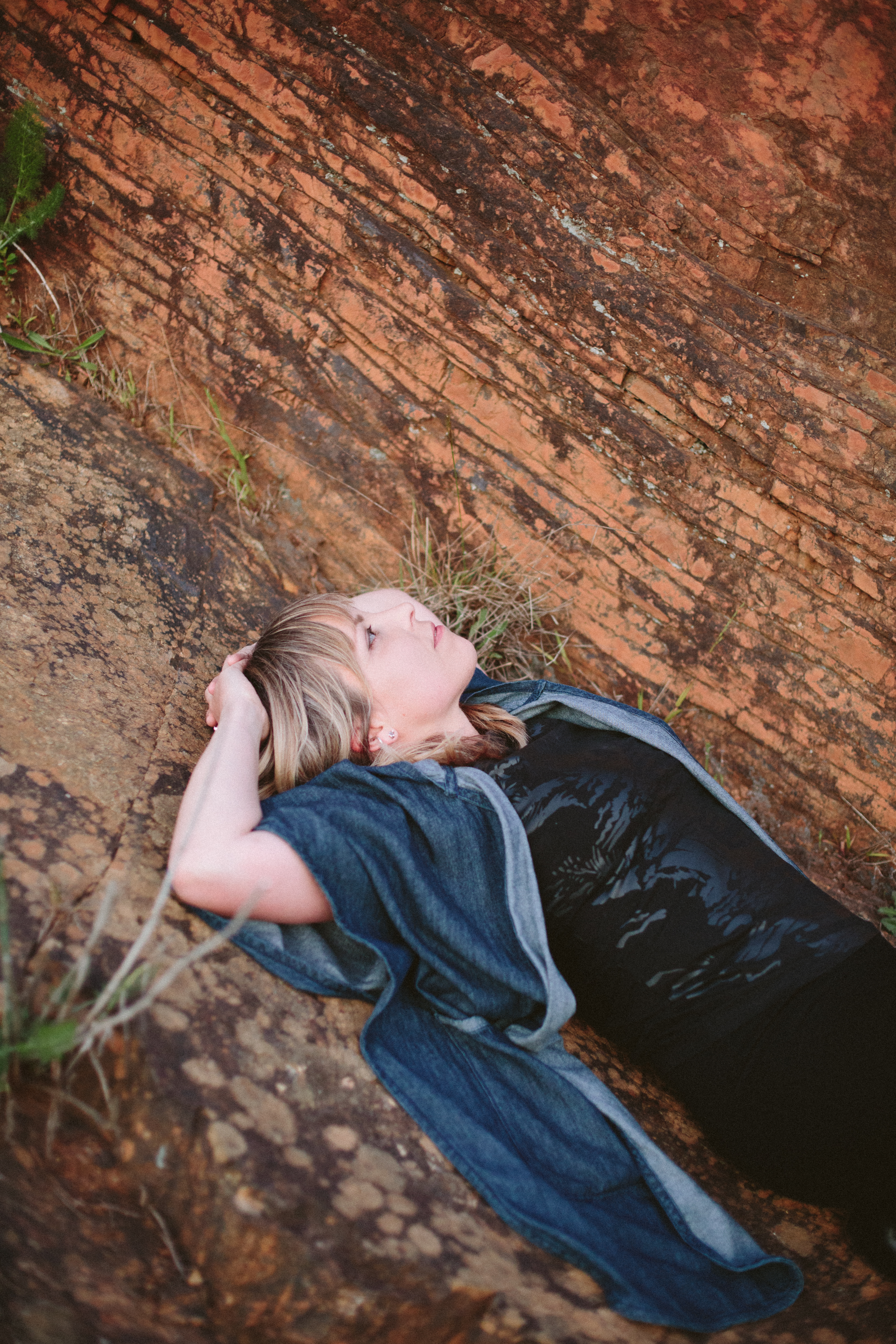Bubblin’ Up: Bleie
San Francisco's Sarah Bly recalls the deeply moving circumstances behind her latest album.

Bubblin’ Up: Bleie
San Francisco's Sarah Bly recalls the deeply moving circumstances behind her latest album.
Sarah Bly’s sheltered childhood in the suburbs of Seattle was full of books, riding bikes, and music. Her strict but artistic parents cultivated her love for different forms of music and encouraged her to take piano and violin lessons at school. “I definitely had trouble handling my emotions growing up. Books and music were my greatest solace, and still are,” Bly explains. Employment at a local library introduced her to “weirder” music and led her to taking the bus into Seattle to visit the Wall of Sound record store. Her earliest experiences of electronic music were shaped by two records: Aphex Twin’s Ambient Works Vol. II. and Boards of Canada’s Hi Scores. “Words cannot describe how transfixed I was by these sounds at that time,” she recalls. “I found the endless permutations of timbre and structure intoxicating.” The novelty and freedom of electronic music appealed to her after years of being trapped by the rigours of ensemble orchestras.
Enrollment at the University of Washington saw her catch the heyday of NAF Studios and the last of the big underground raves like USC’s annual Freak Nights. She also met up with some guys from a group called Starseed, run by Michael Manahan, which later turned into Oracle Gatherings; and she became part of the drum & bass and jungle scene centered around The Baltic Room. She didn’t begin producing music until 2010, upon moving to Colorado for graduate school, and became Bleie, her ancestral Norwegian last name, in 2015 with her first release, Anaamnesis, on San Francisco’s 3am Devices.
Only recently, Bly shared her second album, The Adept, a nine-piece burst created in the wake of December 2016’s Ghost Ship fire that killed a total of 36 people, including many of her friends. It lands via Last Faith Studio, and blends the heavy energy of techno with a depth of feeling and texture; dark, beautiful environments are populated by deeply evolving tonal instruments, roiling percussion, hazy distortion, and crisp sound design. Talking publicly for the first time since the tragedy, Bly chatted with XLR8R about her musical journey, and how her recollections of the Ghost Ship fire are deeply instilled in her latest work.
You keep releases to a minimum, with only two EPs to your name. What fills your time outside of music?
I actually feel like I’ve been quite prolific, considering my day job. I am an I.T. support engineer for a growing public non-profit charter school entity called Caliber Schools, based in Richmond, California. Before Caliber, I was living out in remote areas from Baja to Southeast Alaska, working as a wilderness therapist and outdoor educator. If you had talked to me in 2014, I would have told you my goal was to be on a search and rescue ski patrol somewhere in Colorado, training to climb and ski another big peak. I never thought I would be in this position now, focused almost entirely on music, and staring at screens both for a living and as a hobby.
That’s a big shift in focus. How did this happen?
The shift in focus occurred gradually over time. After leaving Colorado, I headed to Yosemite and I really started to miss being able to see and participate in electronic music events. There wasn’t much of a music scene in Yosemite outside of a few local bluegrass shows each year. When a naturalist position opened up in the Marin Headlands in 2012, I took it for the chance to start getting into electronic music seriously again. I missed having friends to talk production with like I did in Colorado, and I wanted to get better at it. I would ride my bike over the Golden Gate bridge to go to shows in the city, often alone.
At first, all I could find were overly commercial events with nary a head in sight, but finally in 2014, Scott Boutin (a.k.a. Blue Soul) “discovered” me and directed me to the underground scene I had been looking for. He even helped me put out my first release on local label 3 A.M. Devices. Since then, I’ve basically been learning how to make electronic music in public, by playing tons of live shows. It’s really shaped the way I write to the point that I barely write tracks any more. It’s more of a loose flow.
You got into electronic music through IDM. How does this influence your work?
I am definitely mostly an old IDM head. I loved those epic 13-minute tracks from The Orb with spontaneous carnival music and whale sounds, interspersed with NASA broadcasts. They were so irreverent and psychedelic. I also really loved The KLF, Autechre, and The Future Sound of London, and I remember seeing Autechre in the early 2000s in Seattle. I love everything from Mille Plateaux to Casino Versus Japan and old forgotten artists like the Higher Intelligence Agency. I love just about everything on the Warp label and PAN. This influence is probably most present in my ambient music, and perhaps in my drum programming. I absolutely love writing ambient music. It feels like I am conducting clouds.

There’s been a lot written about San Francisco and the suffering arts scene. What keeps you in the area?
This is actually an incredibly interesting area to be in right now, from an anthropologist’s perspective. What would Tom Wolfe do? We are a huge social experiment in the excesses of late-stage capitalism, evidenced by the hundreds of Lime scooters thrown into Lake Merritt on a daily basis, which are now killing fish. There is now a new scooter removal company that charges them a fee to get their own scooters back. It’s like call and response startups over here. I feel like I’m half an acid tab away from “Logan’s Run” on a good day. It’s fascinating, if you can avoid the existential dread triggered by seeing the modern day equivalent of Alex P. Keaton pass you on a motorized unicycle in traffic. As to what keeps me here, naturalists have a handy acronym for that: Move, Adapt, or Die. So far, I’ve been adapting.
How much has the influx of tech companies impacted the music scene in San Francisco?
Ninety-nine percent of people here would say tech influence has been negative, and I would not entirely disagree with them, but there is a much underrepresented current here that I would like to touch upon.
Within the San Francisco underground over the last few years, there has been a real upsurge in talent, both in the promotion and the production of music. Some of these newcomers are in the tech industry, and I’m super grateful for them. I don’t want to out anyone as a tech person, since that can be seen as a bad word in some circles, but there are “techies” involved in nearly every underground music venture I’ve seen here. To be involved with tech is not in itself a bad thing. Tech is a tool, like money, and it is how you use it which determines its value.
I feel that all of this new money and innovative ferment is actually a huge boon. We should be partnering with tech companies to funnel this energy into the arts. There is so much potential here for convincing rich tech wannabe Burners to fund more worthy channels of new age midlife crisis rebirthing, such as my new album! Albeit far-fetched, I could see San Francisco evolving into a kind of American Berlin, in which we heavily subsidize arts education and production, and the artist is seen as the ultimate person of interest. Science and art make beautiful babies when they get together.
There seems to be this impression that Bay Area artists need to move away to “make it.” How do you feel about this?
I hear that, I suppose. I don’t really understand the whole fame mechanism, nor do I actively seek it. I started writing electronic music because I wanted to explore my own creative voice. It is more of an inner work. I learn so much from stepping back and viewing my process from a witness perspective. It is absolutely a spiritual practice, where every act is a symbol of my current understanding and development. If I were trying to “make it,” I’d be an entirely different person, and I’m not sure what kind of answer I would give you then. I do have a desire for playing in front of people, and for people to hear my music, but not for actually becoming famous. I don’t think I could handle that psychologically.
If you don’t judge yourself by the fame mechanism, what would be “making it” for you?
Well, why do we need to “make it” in anything at all? I have spent most of my adult life deconstructing this need I have always had to please, to achieve. It comes from a feeling of lack inside, and it isn’t healthy. I began to understand this when I slowed down and looked at the effects my actions were having on my environment when I behaved in this way. I either pulled the wrong people towards me or pushed the right people away and ruined interactions with my impatience for an outcome. I decided I don’t want to be this type of person anymore. My knee jerk reaction is absolutely to seek fame and attention, but it’s like getting burned by an oven repeatedly: after a while you learn to stop putting your hand there. It’s not wrong to strive for something, but if you pay attention you can tell when you might be forcing something too hard or too much, or going for the wrong thing altogether.
Do you think you’ll always be satisfied making music on the side; and do you think it’s possible to fulfil your artistic potential fitting music around your professional commitments?
I actually think that keeping music apart from my main source of income is what keeps it a pure and worthy expression for me. I only want to write music when I feel like it, not to pay the bills. That being said, I am in the middle of restructuring my work/life balance so that I will have more time for music and outdoor pursuits. I also don’t think I would enjoy touring. I need a regular schedule and sunshine to anchor me. I become fully nocturnal in a week without a day job or something to keep me honest. I’d go off the deep end.

Your sound, compared to many of the artists coming from your region, feels darker. Which artists, contemporary and otherwise, do you draw inspiration from?
That’s an interesting perspective. I feel that lately I’ve been primarily inspired by local artists. There is a thriving breakcore scene here, which I’ve been really inspired by, and a lot of the artists here seem capable of a really multifaceted sound, from dark ambient, shoegaze, and psych house, to industrial EBM, IDM, and DIY tech-noise. I appreciate the chaotic good energy here and it encourages me to keep pushing the envelope in my own writing. That being said, I am originally from Seattle and the Pacific Northwest vibe is pretty inextricable from my historical experience. I really relate to the sounds emanating from the likes of Debacle Records, Elevator, Motor Collective, secondnature, Further Records, and Ghost in the Machine up in Vancouver, B.C., just to name a few.
How do you think European techno compares to what’s going on on your side of the Atlantic?
I think people take themselves more seriously as artists in Europe than they do over here in America and in the U.K.. We do lo-fi raw techno better. I’m thinking of L.I.E.S. and Diagonal in particular. Labels like Northern Electronics and Stroboscopic Artefacts have a lovely hypnotic quality. It’s more polished and subtle, but also there is more danger of veering into pretension. Posh Isolation just fully embraces that, which I love.

I’d like to talk about the album. I’m told that “catharsis” sits at its core. Can you elaborate on this?
Absolutely. A terrible tragedy occurred and I felt the need to process that musically. I have a lot of friends who I think were wounded deeply by the death of loved ones, and I wanted to write this album for them as much as for me. I felt the need to sort of come out of the closet spiritually and with own my beliefs, and to share them with others in the hopes that they might be reassured, or at least intrigued by the ideas presented in this work. I have found healing from this process, and I hope that energy is transmitted to listeners somehow.
How do you feel this emotion is reflected in the actual aesthetics of the album?
I wanted to take the listener through a spectrum of different emotions in order to evoke a journey or a pilgrimage to a holy land, similar to Jodorowsky’s “Holy Mountain,” or Rene Daumal’s “Mount Analogue.” You had mentioned earlier that my music has a harsher and darker feel, and acknowledging this darkness is the exact work of catharsis. Also, when I found the movie “Vibration” by Jane Arden, I knew it would make perfect source material because it had all of these perfect quotes for what I was trying to say. It’s about a couple in the 1970s who are looking for the quintessential psychedelic experience, and they do everything from taking the usual psychedelic drugs to living with a group of Sufis. All of the vocal samples were taken from this movie. Because of these starting points, the music may have a cinematic feel to it.
Where were you at the time of the Ghost Ship fire?
Only a few people have known about this until now, but I was literally writing the first version of the title track to an earlier EP called “Certainty is Only a Feeling” that night. I had to get up early for a 5 a.m. flight to Seattle to play a show the next day, and I was still writing parts for the set. I needed a moody, dark, ambient opener, and I selected samples of foghorns, boats, fire crackling, and someone rattling a chain link fence. I was writing up until about midnight when I fell asleep, not knowing anything about the fire just yet. I didn’t realize what had happened until the next morning when I got on my phone and started reading all of the posts on social media that were flying between friends.
It was awful to be apart from everyone in San Francisco at that time. Seattle promoters Matt Drews and Gil Bar-Sela from PISTIL, who are some of the loveliest human beings ever to walk this earth, were so supportive of me, as was the rest of the crew, and offered to let me opt out of playing but I decided to play anyway. After listening over the opening draft of “Certainty is Only a Feeling” again, I realized what I had done. It felt like I had created the soundtrack to that horrific night. That is still how I feel about that track, like it was a channeling. I thought about changing the song or removing the fire sample altogether. Instead, I chose to honor my process and kept it but toned it way down so that it wasn’t as noticeable in the mix.
The press release says that the music grew out of a reappraisal of the way you’re living your life. How has the fire impacted your way of living?
I think I am still coming out of a long depression, beginning with the fire. As for a reappraisal, I think the fire reawakened my long-standing interest in the occult and spiritual practices. I had a kundalini experience when I was 22 that completely changed my life, and I am still integrating that knowledge into my daily experience. It is more like elements of my personality are reorganizing themselves according to newfound principles. It is really slow work. I am rewiring old habits of mind and ways of thinking about the world. The fire reminded me that even though it is extremely daunting at times, inner work is always of paramount importance.
How did the album develop with your grief and self-healing?
I wanted to heal myself and others with this music. Once I found the source material for the vocal samples, the project had a spine and quickly developed from there. I witnessed myself going through pretty extreme highs and lows through the grief intertwined with the creative process. The album material itself flowed out rapidly, but parts of the editing process and the decision whether to release at all was what held things back. However, I think this quiet yin gestation period has been necessary. American culture has a history of devaluing the yin side of things. We don’t want to let ourselves restore and rejuvenate. We are a country of meth and chopped up Adderall. Well, depression forces one into a yin restoration of sorts, and I am still slowly rubbing my eyes and coming out of that.
Can you tell me the story behind the title, The Adept?
The phrase has so many meanings, but to choose just one source, from the Hermetic Order of the Golden Dawn, the path of the adept is that of uniting oneself with a higher and a divine inner genius. The adept must learn to go within and listen to their own inner knowing for guidance. A longtime friend and mentor of mine named Daniel Garber once told me simply to “pay attention.”
All photos: Mariah C. Tiffany

